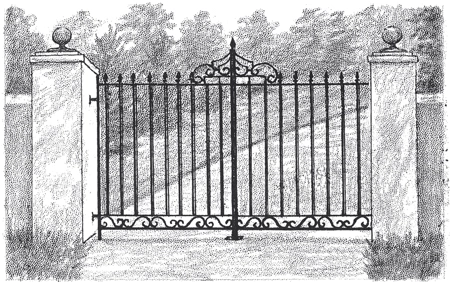There was the sound of footsteps coming up the garden path.
“There,” she cried, in exasperation. “It’s that Hynes!”
She ran toward the door, but before she reached it, it opened, and Hynes came in. The small, thin figure in its checked coat, riding breeches, and cloth leggings halted for a moment. Then Hynes’s eyes turned to the dog before the hearth.
“Ow, Hi thought so,” he cried. “Hi just thought as ’ow Hi’d find ’er ’ere.”
Joe’s father rose slowly.
“I were just cleaning her up a bit,” he said ponderously, “and then I were off to bring her back.”
“Hi’ll bet ye were,” Hynes mocked. “Ye were going to bring ’er back—Hi’ll bet ye were. But it just so ’appens that Hi’ll take ’er back myself—since Hi ’appened to drop in.”
Taking a leash from his pocket, he walked quickly to the collie and slipped the noose over her head. At the tug she rose obediently and, with her tail down, followed the man to the door. There Hynes halted.
“Ye see,” he said, in parting. “Hi wasn’t born yesterday, and Hi ’appen to know a trick or two myself. You Yorkshire-men! Hi know all about yer and yer come-home dogs. Training ’em to break loose and run right back ’ome when they’re sold, so then ye can sell ’em to someone else. Well, it won’t work with me. It won’t. Because Hi know a trick or two myself, Hi do…”
He halted suddenly, for Joe’s father, his face deep red with anger, had started toward the door.
“Er—Good evening,” Hynes said quickly.
Then the door closed, and Hynes and the collie were gone. For a long time there was silence in the cottage, and then Mrs. Carraclough’s voice rose.
“I won’t have it, I won’t,” she cried. “Walkin’ into my house and home without so much as by your leave, and keeping his hat on as if he thinks he’s the very Duke himself. And all on account of a dog. Well, she’s gone, and if you ask me, I say good riddance. Now happen we can have a little peace. I hope I never see her again, I do.”
As she scolded, her tongue running on, Joe and his father sat before the fire. Now both of them stared into it, unmoving and patient, each burying his own thoughts inside himself as the North-country people do when they are deeply troubled.

CHAPTER FIVE
“Don’t Come Home Any More”
If Mrs. Carraclough thought that everything was settled, she was mistaken, for the next day Lassie was at the school gate, keeping her faithful tryst, waiting for Joe.
And again Joe brought her home. On his way, he planned to fight for his dog. To him the course was simple. He felt that when his parents saw the dog’s faithfulness, they would relent and let her stay with them again, and thus reward her. But he knew it would not be easy for him to persuade them.
Slowly he walked up the path with the dog and opened the door. Everything in the cottage was as it had been before—his mother getting the evening meal ready, his father brooding in front of the fire as he did for hours these days since there was no work.
“She’s—she’s come home again,” Joe said.
All his hopes fled at his mother’s first words. There was no surrender in them.
“I won’t have it.
1 comment